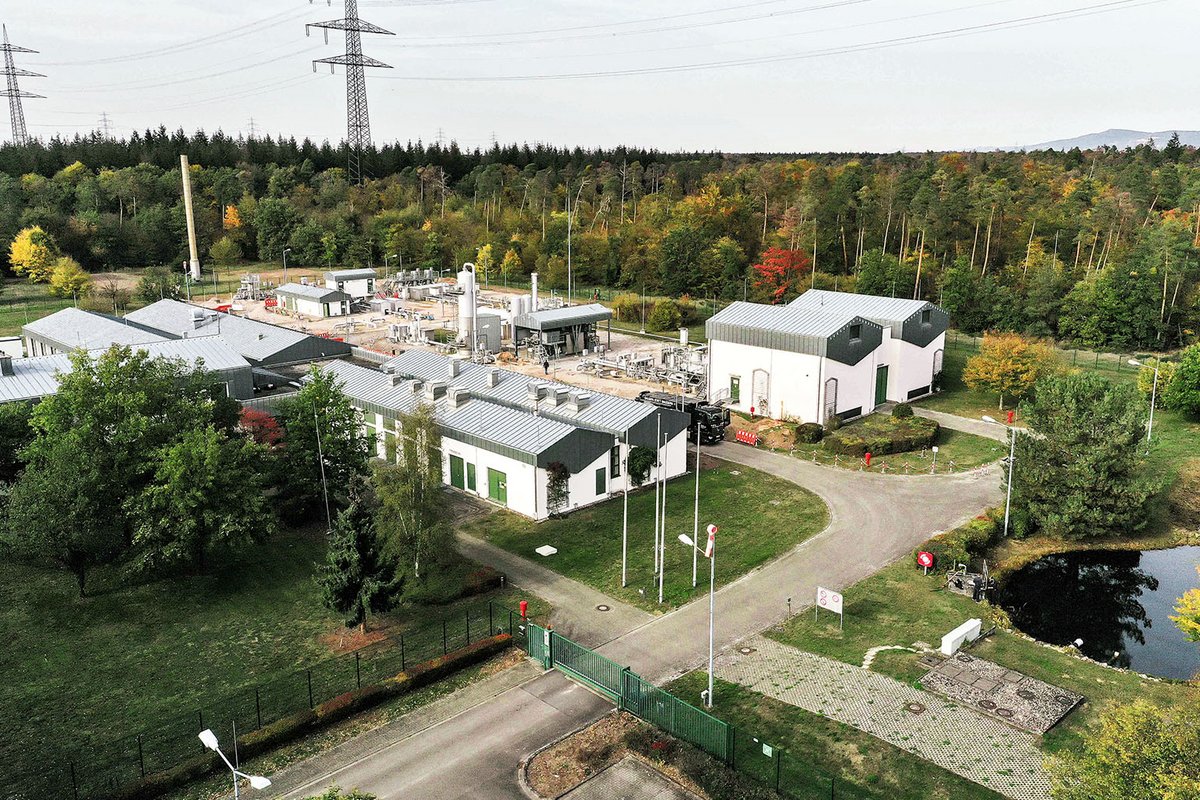Emergency no. +49 711 7812 1220
Hazardous Incident Ordinance info. for Sandhaus Gas Storage Facility & Natural Gas Safety Data Sheet

As of 1 January 2018 terranets bw introduced a new product to stabilise the gas supply in Baden-Württemberg in the case of maximum loads. LiFA stands for load flow commitments in the form of shutdown contracts (German: "Lastflusszusagen in Form von Abschaltverträgen") and is a temporary product that is directed towards distribution system operators in our network area. To stabilise the grid, LiFA uses available peak load instruments and shutdown potentials of RLM customers.
All distribution system operators (DSOs) directly downstream of terranets bw can take part in the call for tender for load flow commitments. The DSO directly downstream of terranets bw bundles the potential of the customers that can be shut down in its grid and, if necessary, in the next grid downstream.
Aligning with stipulations set out by the Federal Network Agency on the costs for load flow commitments as volatile costs in the sense of section 11 paragraph 5 ARegV ("KOLA"), the minimum batch size is 10 MW per batch.
The design of this new, temporary product is based on the special situation in Baden-Württemberg, which results from a complex structure due to its integration into upstream and European networks and a strongly increasing demand for shipping capacities in the distribution grids.
The demand for capacities in the supply area of terranets bw has been characterised by a continually increasing demand in the downstream grids since 2010. Shipping demand reported to us by distribution system operators within the scope of internal orders in the terranets bw network increased in 2017 and 2018 by approx. 4 % respectively compared to the previous year.
This means that the existing potential of available peak load instruments and shutdown potentials of RLM customers can be used in the whole terranets bw network area to ensure security of supply in Baden-Württemberg in the event of a gas shortage.
LiFA therefore follows on from the expired shutdown contracts that the state regulatory authority of Baden-Württemberg had approved to date as an instrument to even out demand peaks. With LiFA, DSOs that do not fall under the regulatory regime of Baden-Württemberg´s state regulator but under that of the Federal Network Agency are also entitled to take part in the tendering procedure.
terranets bw publishes a call for tender for LiFA capacities with a minimum batch size of 10 MW for the duration of one year respectively.
Call for tender text LiFA (PDF, 493 KB)
Tenders may be submitted as follows:
As soon as the contract has been awarded, terranets bw and the selected DSOs conclude bilateral LiFA contracts.
It is prohibited to market shutdown potentials twice (e. g. in NCG auctions for balancing energy such as LTO and DSO). The bundling ("pooling") of several shutdown contracts into one batch is possible so that shutdown potentials of less than 10 WM may be taken into consideration.
Remuneration is initially paid by terranets bw to the DSO whose tender was contracted. Then further settlement takes place between DSO and shutdown customer. The costs resulting from LiFA are distributed and passed on via terranets bw´s grid charges.
terranets bw is working hard to improve the current capacity situation. Alongside LiFA, load flow commitments at entry points into our network are also being tendered in order to close the capacity gap between entry and exit capacities. Insofar as interruptible capacity shares can be converted into temporary firm capacities by means of these load flow commitments, the resulting costs are passed on to all network customers in the terranets bw network. The correspondingly generated temporary firm order capacities are billed at the regular fee.
The aim of LiFA contracting is to enable a demand reduction in high-load situations to avoid interrupting interruptible allocated capacities as far as possible.
If required, terranets bw announces the LiFA situation with directly downstream DSOs that have concluded LiFA contracts. In turn, the respecitive DSOs are responsible for shutting down the "shut-down customers". There is no communication between terranets bw and these customers.
When terranets bw invokes this situation, the permissible capacity supply at the respective regional cluster is reduced by the same amount as this load flow commitment. The interruption of capacities contracted under LiFA occurs parallel to the interruption of interruptible internal order capacities.
The contractual penalty provision determined in the LiFA contracts are applicable should the DSO exceed the then still permissible capacity. The provision is based on that of the internal order. Publication of the price list including the amount of the contractual penalty appears on 03.06.2022. Please note: The prices published on 03.06.2022 are still excluding cost distribution allocations and metering fees. These parts will be published at a later time.
The first quarter as well as November and December are defined as possible interruption periods for 2023. In these periods LiFA can be invoked for a maximum duration of 240 hours per calendar year and contract and shall take place by 12:00 h of the previous day for the subsequent day from 6:00 h for LiFA with demand prices. For LiFA with energy rate components it may be involked with a notice period of two hours.
The process of invoking LiFA is fundamentally based on the forms used within the scope of the "Guideline for Gas Crisis Prevention". This guideline was adapted to the requirements of LiFA and is available as an annex to the call for tender documents:
Load flow commitments are invoked via the communication channel agreed upon in accordance to section 6.7 of the "Guideline for Gas Crisis Prevention" set out in the Cooperation Agreement.
In accordance with the published draft of a shutdown contract, a shutdown customer is merely obliged to pay damages. This does not constitute a contractual penalty. A contractual penalty does not therefore have to be published.
"Agreed maximum capacity" is the firm and interruptible capacity agreed upon by terranets bw within the scope of the internal order, i.e. the total internal order that the DSO has accepted in accordance with the rules set out in the Cooperation Agreement.
This capacity is the starting point for invoking LiFA:

There are various options communicated by terranets bw regarding capacity limits that the DSO may not exceed in the case of congestion:

To invoke LiFA, terranets bw will build on the forms used within the scope of the Crisis Prevention Guideline. These were adapted to the requirements of LiFA and are available in Annex 2 and Annex 3 of the call for tender documents. If necessary, the forms will be sent to the email addresses stored for this purpose. LiFA must be invoked by 12:00 h of any one day for the subsequent day. Provision of the LiFA shall take place from 06:00 h, whereby the perod for invoking LiFA can be between 1 hour and 240 hours.
DSOs are responsible for the pooling of potentials. They pool the individual offers in advance and offer them to terranets bw in one offer within the scope of the call for tender.
The contractual penalty is calculated in accordance with the price list published by terranets bw. Accordingly, it amounts to twice the annual capacity charge for the maximum hourly capacity overrun on that day in the period from 01.01.2022, 06:00 h to 01.04.2022, 06:00 h as from 01.10.2022, 6:00 h to 01.01.2023, 06:00 h. It accumulates each day.
The annual capacity charge does not include the charges for metering, metering point operation, biogas cost allocation and market area conversion according to number I of the price list.
Please note: Prices published on 28.05.2021 for 2022 are still exclusive of levies and metering charges. These will be published at a later time.
Example for a maximum overrun to the amount of 1,000 kWh/h on a day:
1,000 (kWh/h) * 5.1447 € (annual capacity charge Q1 2021 incl. additional costs) * 2 = 10,289.40 €
For each additional day where there is an overrun, the contractual penalty shall accrue taking into account the respective maximum overrun.
Despite exceeding the applicable capacity limit after invoking LiFa, there is then no obligation to pay the contractual penalty if providers prove that the existing shutdown contract or contracts in their and/or the downstream grids was or were actually used to the necessary extent and that the shutdown potential resulting from this use of the shutdown contract or contracts as well as the internal order was or were calculated correctly. Calculation of the internal order is set out in sections 13, 14 of the Cooperation Agreement. By applying the procedure described in the agreement and taking into account the gas industry´s duty of care, it may be assumed that the internal order has been calculated correctly. Basically, nothing further shall apply regarding the calculation of the shutdown potential. Sections 13, 14 of the Cooperation Agreement contain rules on considering capacity reducing instruments in the internal order with regard to the gas industry´s duty of care. In particular, this also includes consideration of the simultaneity effect as well as known future changes in the energy demand at the offtake point. As long as these rules are observed, it can also be assumed that the shutdown potential has been calculated correctly. Nothing else is applicable for any possible storage potential.
For the sake of clarity, we would like to point out that the contractual penalty rule set out in the price list for 2022 will be identical to the contractual rule set out in the price list 2021 (VII Contractual penalty).
The provisional capacity charge for internal order points and end consumer points as of 01.01.2022 is 3.51 €/(kWh/h)/a for firm, freely allocable annual capacity (FZK) in accordance with REGENT. Pursuant to section 6 (5 ) of the Cooperation Agreement between operators of gas supply networks in Germany, as amended on 31 March 2020, effective from 01 October 2020 (KoV XI), the final charges at these points will be published by 2 December 2021 at the latest. Although it can be assumed that there will be no significant change between provisional and final charge, no final statement may be made at this point regarding the actual tariff for 2022. Please refer to the publication below regarding this issue:
Information of terranets bw on the capacty charge effective from 01.01.2022
To give you a quick overview of the LiFA product, we have summarised the most important aspects in the document below:
All information required for participating in the tendering procedure is available as soon as the tendering process has started in our section Calls for tender.
The results of the tendering process are available in the section market information under "LFC calls for tender" (German: "LFZ-Ausschreibungen") as soon as the tendering process has ended.
The process for invoking LiFA is fundamentally based on the forms used within the scope of the "Guideline for Gas Crisis Prevention". This was adapted to the requirements of LiFA and is available as Annex 2 and Annex 3 in the call for tender documents. Invoking load flow commitments takes place via the communication channel agreed uponn in accordance with section 6.7 of the "Guideline for Gas Crisis Prevention" set out in the Cooperation Agreement.
Contractual agreements regarding LiFA are concluded between:
Hereafter you can find non-binding sample contracts between the direct DSO and the network user and between the direct DSO and their downstream network operator.

